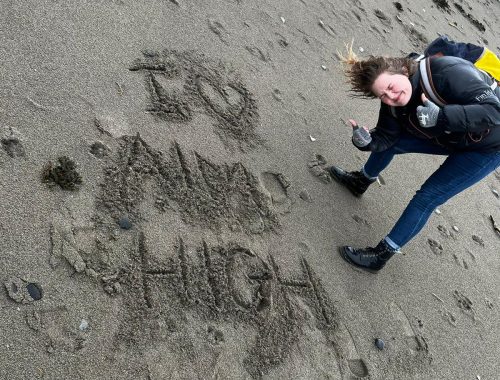Editing a West End Star’s Biography for Into the Woods: “Have I taken too much out, madam?”
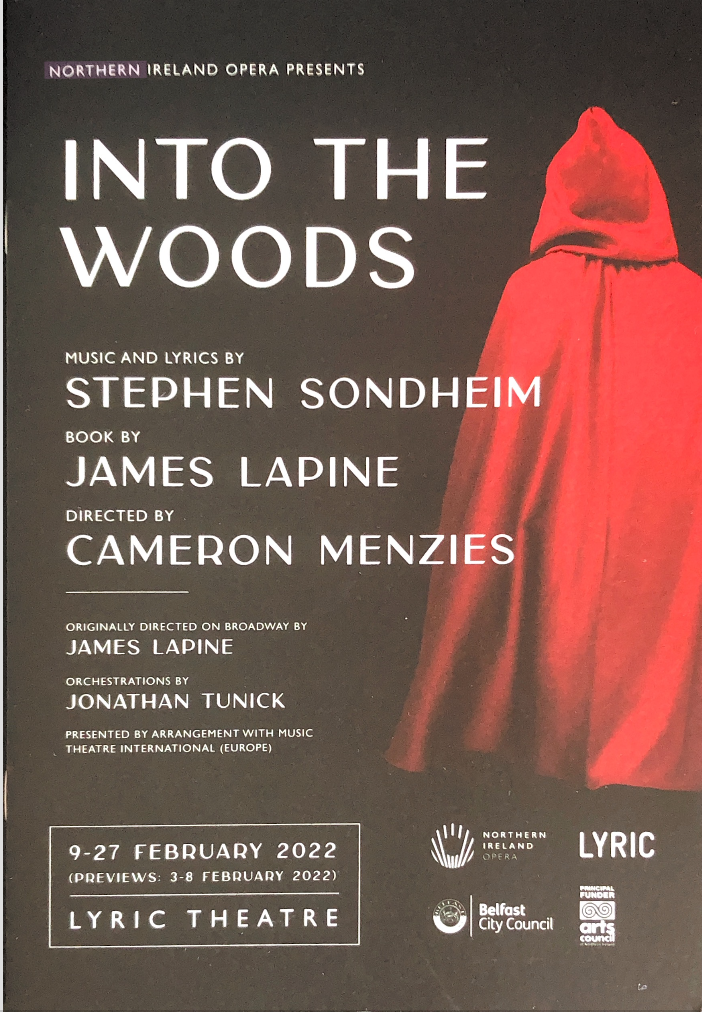
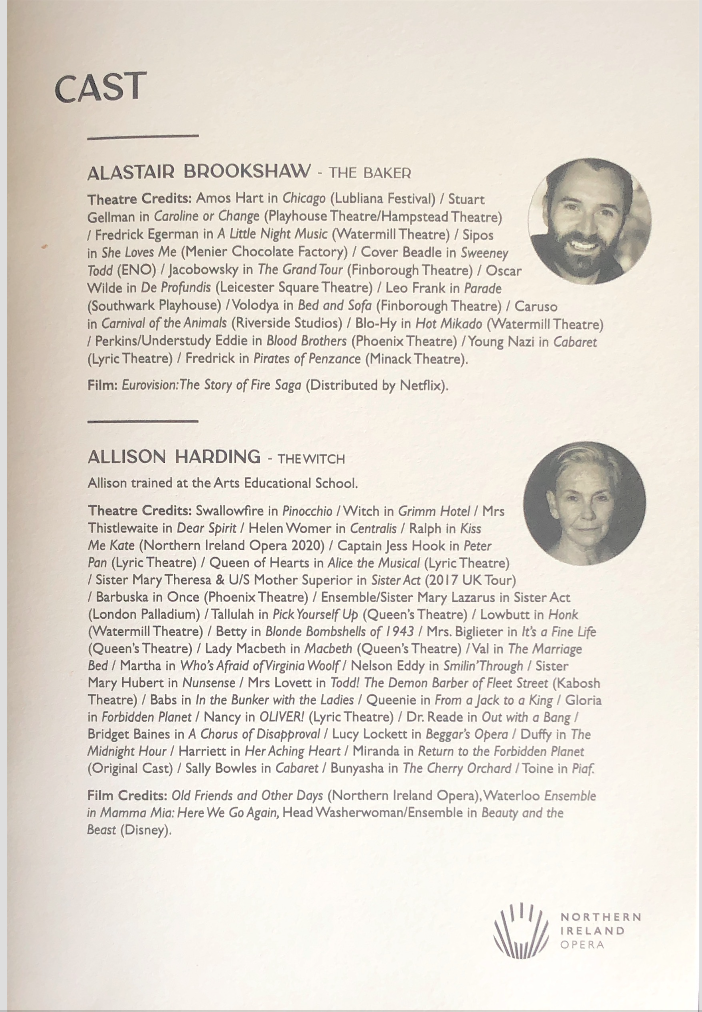
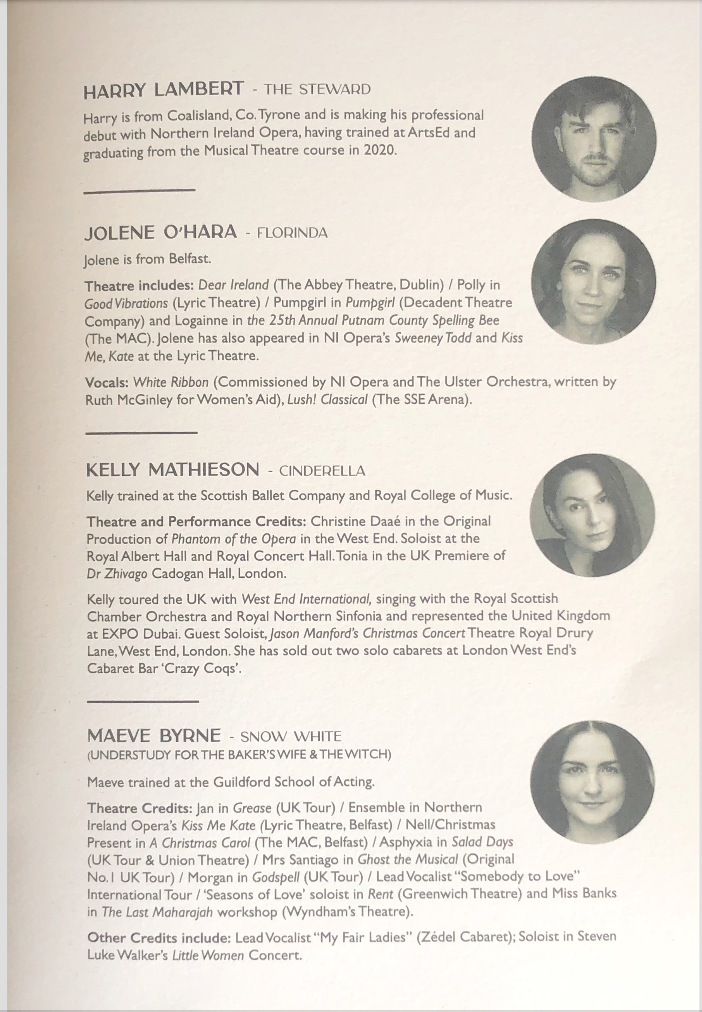
An Easy Start?
Initially, working with NI Opera has not been a stressful ordeal. I have completed research tasks, worked front of house for multiple shows, and engaged in admin work. Conversely, I was tasked with editing the biographies within their Into the Woods programme. This blog will focus on this task, and how it became quite stressful. I was given this task at around 12:00pm on the 2nd of February and the deadline was set for the same day at 3:30pm.
When reflecting upon this experience with NI Opera, I will use the Barbara Bassot Integrated Reflective Model (See Figure 2); this model is said to be “inspired by a range of other frameworks, include Gibbs’ reflective cycle, the integrated reflective cycle contains fewer steps which may make it simpler to work through, while still being able to bring out the same realisations and learning.”.[1]
[1] The University of Edinburgh, The Integrated Reflective Cycle, https://www.ed.ac.uk/reflection/reflectors-toolkit/reflecting-on-experience/the-integrated-reflective-cycle [Accessed 31/03/2022]
This model follows the linear flow of ‘The Experience’, ‘Reflection on Actions’, ‘Theory’, and ‘Preparation’. Following these four steps will allow me to give a detailed account of the most challenging experience that I faced during my work placement with NI Opera.
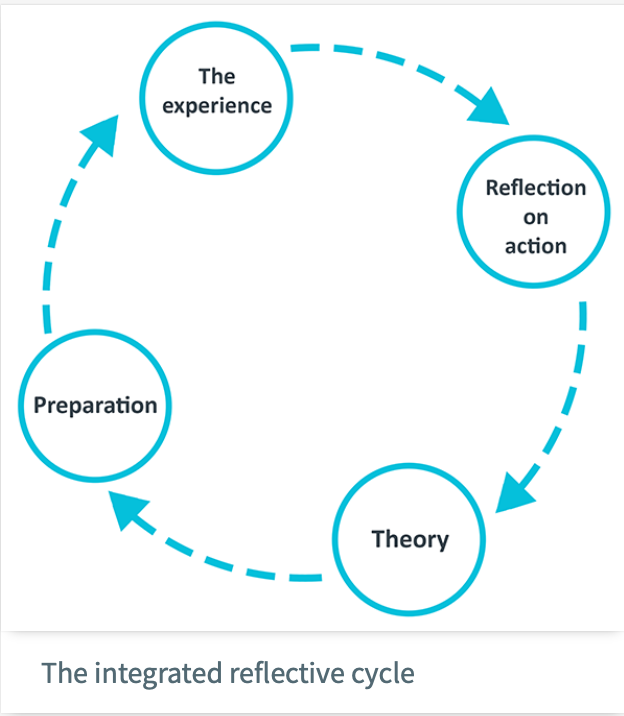
Tasked with editing 19 biographies for their Into the Woods programme that was due to be sent to the printers by the end of the day. Biographies are an important part of a shows production process, as explained by Philip Rahm
The least they can do, if not pay them, is that they put out names AND biogs that will connect to a performance or to a creative input, and thereby reward the financial sacrifices of those who put their heart and souls into these shows.[2]
[2] Philip Rham, SceneSaver: The Importance of Theatre Programmes, < https://www.scenesaver.co.uk/blog/the-importance-of-theatre-programmes/> [Accessed 06/04/2022]
Although the cast of Into the Woods was getting paid, they still required a programme to get their names out there and, in some cases, ‘re-discovered’. Editing the ‘big names’ of the cast proved to be a challenging and daunting task; Kelly Mathieson (See Figures 3 and 4) had starred in the Her Majesty’s Theatre run of The Phantom of the Opera for 2 and a half years from 2017 to the 17th ofMarch 2020 (the start of the COVID-19 pandemic).
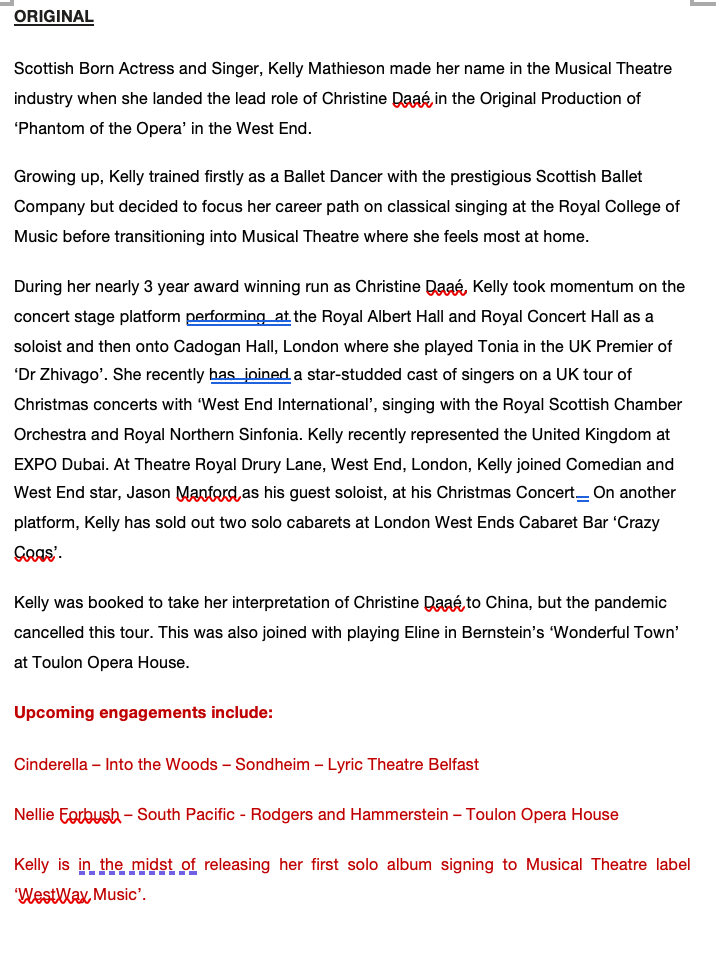
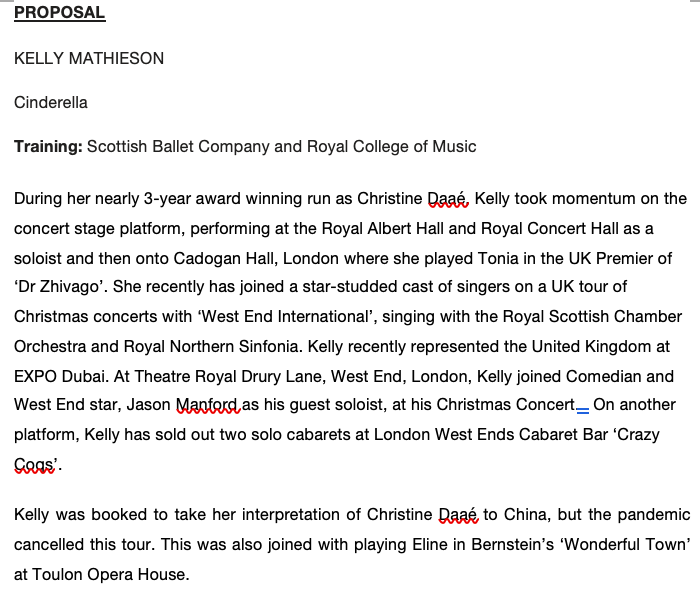
If editing a bio for Kelly isn’t scary enough, there was also Alastair Brookshaw who had starred in Eurovision: Fire Saga, Allison Harding, May McFetridge (the Queen of Belfast), and Sean Kearns. I was given this task by the marketing manager Julia O’Hara and Simon one of the admin managers; both colleagues were very supportive, asking if I needed anything printed out or required an extra computer to work on; this did remove some of the stress, however, not all of it. I had a class at 4pm that day and was assigned this task at 12:00pm, therefore, the pressure was on to get each biography compiled, formatted, and edited which proved to be an impossible task before leaving at 3:30 for class. I was unable to get all 19 of the biographies completed; I did manage to complete 11 of the cast biographies, however, Simon was tasked with completing the last 8 when I left. After leaving at 3:30, I was disappointed in myself as I believed I could have completed all 19 biographies within the time limit; I felt as though I had placed a burden on the admin manager Simon. Although this was disappointed, it was an opportunity to learn through experimental practice; as I have had little experience in editing cast biographies, experimenting with my creativity has allowed me to learn for the future as “ELT (Experimental Learning Theory) defines learning as “‘the process whereby knowledge is created through transformation of experience’.”[3]
[3] Alice Y. Kolb, and David A. Kolb, “Learning Styles and Learning Spaces: Enhancing Experimental Learning in Higher Education.” Academy of Management learning & Education, vol.4, no. 2, (2005) pp. 194
Moreover, reflecting upon this I realised that I was attempting to impress both Simon and Julia by creating a professional compilation of biographies, which left me with not enough time to complete the task. I believe I took too long on the first few biographies; these first biographies were some of the big names, with the most credits – I felt afraid to remove too much, which may anger the cast member; some credits are more important than others in a cast members biography; I was anxious to remove credits which were vital to the cast member. As I finished as much as I could on the task, I felt accomplished yet disappointed in myself; I wish I was able to get all the biographies completed. If I had removed all distractions; for example, my phone; worked out how long I had to completely format each biography, I would have completed the whole task
In relation to the learning outcomes and experience within this position, I believe that it was a rich experience that has allowed me to identify existing and new-work related skills such as time management and stress management. In future tasks, identifying the stress immediately will enable me to complete similar tasks within small time frames. “If you learn to deal with stress and master it, stress can make you stronger.”.[4]
[4] Dr. Walter Menninger in ‘Judges Told How to Deal with Stress’, American Bar Association, Martha Middleton, vol. 67, No. 9 (1981) pp. 1100
With this notion of stress making you stronger, I have been able to utilise the stress that the task caused and turn it into a skill for the future.
In conclusion, I will ensure that I approach any similar, time-sensitive task in a calm manner, ensuring I allow myself enough time to complete the task and review it. Allowing myself to reflect upon this experience through the Integrated Reflective Model has aided me in building upon this experience and learning for the future. I will ensure that I approach similar tasks through two methods; firstly, I will attempt to ‘map’ out my task in terms of allocating certain sections to be completed in a certain time frame. Secondly, I will ensure that I ask for help if required, I tended to attempt to get the last task done by myself, however, this didn’t work. This stressful situation has allowed me to grow and become stronger in my career pathway; utilising this skill in the future will allow me to remain calm under pressure in the workplace, keep a level head and complete my tasks on time.
Bibliography
Kolb, Alice Y. and. Kolb, David A. “Learning Styles and Learning Spaces: Enhancing Experimental Learning in Higher Education.” Academy of Management Learning & Education, vol.4, no. 2, (2005)
Menninger, Dr. Walter. in ‘Judges Told How to Deal with Stress’, American Bar Association, Martha Middleton, Vol. 67, No. 9 (1981)
Rham, Philip. SceneSaver: The Importance of Theatre Programmes, < https://www.scenesaver.co.uk/blog/the-importance-of-theatre-programmes/> [Accessed 06/04/2022]
University of Edinburgh, The. The Integrated Reflective Cycle, https://www.ed.ac.uk/reflection/reflectors-toolkit/reflecting-on-experience/the-integrated-reflective-cycle [Accessed 31/03/2022]
List of Images
Figure 1: McCready, Charlie. Into the Woods Programme Sample
Figure 2: University of Edinburgh, The. The Integrated Reflective Cycle, https://www.ed.ac.uk/reflection/reflectors-toolkit/reflecting-on-experience/the-integrated-reflective-cycle [Accessed 31/03/2022]
Figure 3 and Figure 4: McCready, Charlie
Shaping my future
You May Also Like

Patience is a Virtue
26 March 2022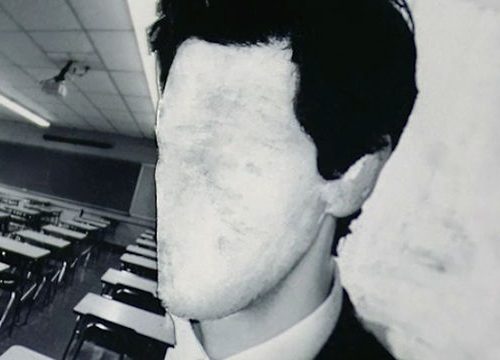
The Equity Of Detachment
25 March 2022